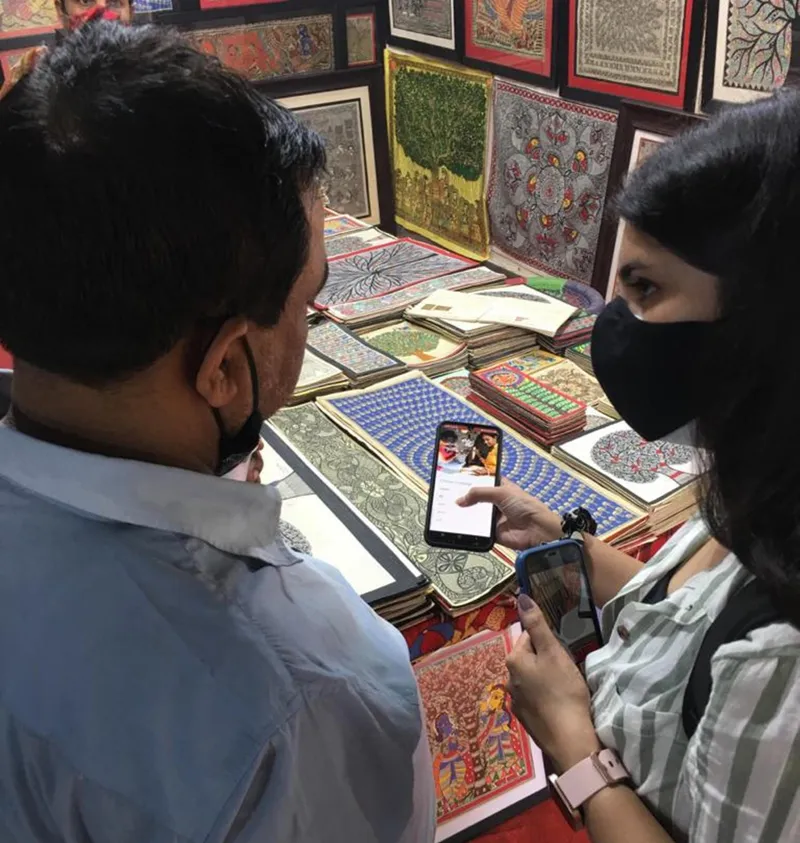This B2B marketplace for rural artisans is helping the handicraft and handloom industry adopt digital tools
Noida-based Lal10 is an online wholesale marketplace for rural MSMEs. The brand has connected weavers and artisans with labels, including Zara, Anita Dongre, Toast, Wills Lifestyle, FabIndia, Four Seasons, and Taneira.
The Indian handicraft and handloom industry — one of the largest employers in the Indian economy — employs over 4.3 million people directly and indirectly, according to IBEF.
The industry is an important revenue generator, with exports in FY20 amounting to $319.02 million.
Like several other sectors, the handicraft and handloom sector came to a grinding halt when the COVID-19 pandemic struck. Saddled with piling stock and no offline marketplace available, weavers and artisans realised going digital is the only way to move forward.
Moreover, this highly fragmented and unorganised industry has seen its gears changing with more B2C and B2B players emerging in the space, including the likes of , , , Amazon Karigar, , , and more.
Noida-based , too, is one such company. Founded in 2017 by Maneet Gohil, Sanchit Govil, and Albin Jose, Lal10 is an online wholesale marketplace for rural micro, small and medium enterprises (MSMEs) in India. From apparel, handbags, to lampshades, it has a total of 30,000 stock-keeping units (SKUs).
The name Lal10, pronounced as lalten (meaning lantern), is derived from the company’s mission to “bring light to the artisans”.
In March 2020, Lal10 raised a seed round from Sorenson Impact from Utah and a few angel investors. The brand has connected weavers and artisans with labels, including Zara, Anita Dongre, Toast, Wills Lifestyle, FabIndia, Four Seasons, and Taneira.
In a conversation with SMBStory, Maneet talks about the company’s effort in digitising and organising the sector and how COVID-19 brought changes within the organisation.
SMBSory [SMBS]: How was the company formed?
Maneet Gohil [MG]: My grandfather was a micro-entrepreneur who had his unit, with a couple of artisans working under him. When I would visit him during his summer vacations, I observed him and was intrigued by the industry.
After completing my MBA in 2015, I worked at Flipkart briefly to understand ecommerce and technology. Lal10 was always on my mind; I was looking for the right opportunity.
So I started working on the concept on the side while doing my full-time job. I completely immersed myself in the business in 2017, and my former colleague Sanchit Govil and a friend Albin Jose joined me as the co-founders.
SMBS: What does Lal10 aim to solve?
MG: One of the main challenges my grandfather faced was access to the market. This industry is capital intensive, which makes it difficult for artisans to hold on to their inventory for very long.
In 2017, we travelled across India, and after meeting over 6000 artisans, we realised this is a common dilemma.
Lal10 is a B2B platform that bridges the gap between a rural artisan and an urban customer.
SMBS: How did you convince the artisans to come onboard? How did you educate them since your format is entirely based on technology?
MG: We work with micro-entrepreneurs who have several artisans working with them. We train these micro-entrepreneurs, who, in turn, encourage the artisans to use the application.
This is very useful since people trust the locals more than an outsider who comes and tells them to do something.
Everything is developed in-house. We have hired UI/UX experts to work on the application. All an artisan needs to do is create their profile on the app and upload their stocks. When they find a buyer, the transaction takes place online. We charge a percentage as commission, and the rest goes into the pocket of the artisan.
Today, we are working with approximately 1,500 artisans across the board. We have served over 400 retailers in 19 countries, including the US, Europe and the Middle East.

SMBS: How has COVID-19 accelerated digital adoption within this industry?
MG: In the pre-pandemic era, artisans were heavily dependent on exhibitions, trade shows, etc., all of which have collapsed now.
What we also observed was that several artisans, who had some bit of technical knowledge, made pages on Instagram to sell their products. However, in a B2B structure, they had no idea how to bring traction to their pages, or how to help buyers land up on their pages.
This is where we came in. We had several weavers from Odisha, Telangana, Gujarat, Maharashtra, etc., but after the COVID-19 pandemic, our reach expanded. We onboarded 600 MSMEs during the pandemic.
We have onboarded artisans from Kashmir, Bihar, and the Varanasi belt in the last 15-18 months. We are growing at 80 percent monthly for the past three months.
Additionally, we are in the process of onboarding 2,000 more MSMEs in the next quarter, thanks to the acceleration in digital adoption.
SMBS: What are your plans for the next 12-18 months?
MG: We want to tap into the export market in the coming times because we have observed a huge increase in the number of global buyers visiting our platform.
We plan to launch a warehouse in the US and some of the European markets. We are also working on innovating our platform. For instance, we are improving upon the image processing aspect and providing more vernacular language tools.
Further, we also plan to expand our market reach to South Asian countries like Thailand, Vietnam, Indonesia and the Philippines.
YourStory’s flagship startup-tech and leadership conference will return virtually for its 13th edition on October 25-30, 2021. Sign up for updates on TechSparks or to express your interest in partnerships and speaker opportunities here.
For more on TechSparks 2021, click here.
Edited by Suman Singh









